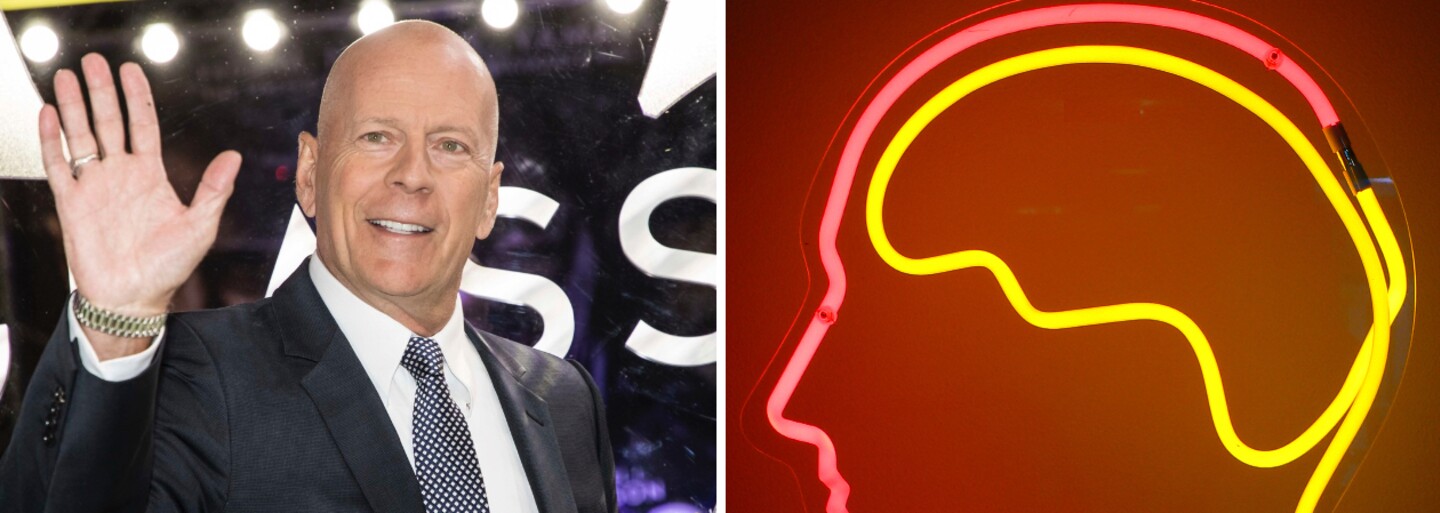 TOP 8 Oscar-winning romantic movies you must watch with your significant other on Valentine's Day
TOP 8 Oscar-winning romantic movies you must watch with your significant other on Valentine's Day
TOP 8 Oscar-winning romantic movies you must watch with your significant other on Valentine's Day
TOP 8 Oscar-winning romantic movies you must watch with your significant other on Valentine's Day
What Ended Bruce Willis's Career? Aphasia Is a Speech Loss Condition Which, According to Experts, Will Only Get Worse
What is aphasia and what types are there? Speech therapy professor expects that the actor is suffering from a form of dementia that begins with the breakdown of speech.
If problems persis, please contact administrator.

Bruce Willis's family announced on Instagram, that the 67-year-old Hollywood actor has to end his career. His relatives wrote, that a health condition was behind this unexpected decision. Doctors have only recently diagnosed him with aphasia, the loss of ability to communicate.
Dementia, which begins with the loos of speech
According to clinical speech therapist Zsolt Cséfalvay of Comenius University, who has been working with aphatics for more than thirty years, most cases of aphasia occur during strokes. However, according to him, Bruce Willis suffers from a different, rarer and, unfortunately, significantly more severe form of aphasia called primary progressive aphasia (PPA).
With this neurodegenerative disease, relatively inconspicuous speech disorders are only the first symptom, and the patient's condition, according to a speech therapy professor, will get worse over time as the disease spreads through the brain.
Cséfalvay assumes that after aphasia, the rare form of neurodegenerative disease will soon affect the actor's cognitive abilities. "PPA is similar to Alzheimer's dementia, which, initially, manifests as a memory deficit. It's the first signal that a pathological protein has started acting out in the brain."

According to MUDr. Stanislav Šutovský's PPA usually ends in mutism, severe dementia syndrome and akinesia, while the average survival rate of patients, since the onset of the first symptoms of the disease, is only 5 years.
Zsolt Cséfalvay suspects that the legendary actor may to be worse off than most media predict, and that his condition will continue to deteriorate. "As a result of the pathological process, neurons gradually die out, the cortex and subcortical areas of the brain are damaged. At first it is very discreet, but the process is almost irreversible. With the neurodegenerative form of aphasia, there is little chance of improvement."
Less severe types of aphasia are extremely common
According to Zsolt Cséfalvaya, with the types of aphasia caused by vascular events, the prognosis of patients' rehabilitation is significantly better due to the type and extent of brain damage. During a stroke, aphasia occurs due to a focal disorder of the cerebral cortex when a blood vessel in the brain becomes clogged or narrowed. Sharon Stone and Emily Clarke, for example, suffered from aphasia after their strokes. According to the expert, vascular aphasia occurs in about a third of the patients with stroke.
We often use the term "speech loss" when discussing aphasia colloquially. Due to the degree and area of brain damage, the diagnosis may manifest itself in a reduced ability or even a complete loss of the ability to communicate, write or understand the language of others. Vascular aphasia is very often a concomitant manifestation of neurological disorders and also occurs in patients with Alzheimer's disease.
Zobraziť tento príspevok na Instagrame
Causes of aphasia
The risk of vascular aphasia increases with age. In addition to heart attack and stroke, it is also caused by a head injury. Other causes include brain tumour or infection.
Vascular aphasia, which has no effect on the patient's intelligence, manifests itself especially through speech difficulties. Patients often have trouble expressing an idea, finding the right word, and tend to use nonsensical words and phrases. During the conversation, the words can also be repeated or omitted.
Aphasia belongs to a broader group of brain damage diagnoses, including alexia, which causes loss of reading, agrafia, loss of ability to write, agnosis, loss of cognition, and calculus, which refers to loss of ability to count.
Aphasia, which limits communication skills, occurs as a result of damage to the areas of the brain responsible for forming one's own speech and understanding the speech of others. Aphasia causes the disintegration of the entire human psyche and impacts all speech functions.
There are currently no preventive measures for aphasia. As far as prevention, it is only possible to fight against the development of primary diseases that can cause aphasia - brain trauma or brain damage during sports, transport or work.
Types of aphasia
Aphasia is divided into several types depending on the extent and location of the damage. In the case of the so-called expressive aphasia, one understands other people, and even though he knows what he wants to say, he has problems with expressing himself. A patient suffering from sensory aphasia can form relatively long sentences, but its expression is incomprehensible. He uses non-existent words, repeats them, gets lost or gets tangled up. A relatively mild form, is the so-called anomic aphasia, in which one has problems naming objects and finding suitable words. At the other end of the scale is global aphasia, in which speech centre damage is so severe that the patient completely loses communication.
If aphasia is suspected, it can be detected using neurological tests and then confirmed through magnetic resonance imaging. Early diagnosis and a reasonably rapid initiation of effective broad-spectrum therapy, are the prerequisites for improving communication in most aphasics. Inclusion of patients within the primary social environment and family is crucial, while in some cases, it is also possible to return to the work environment.
Life with aphasia
If the aphasia was caused by a brain tumor, the patient's condition can be improved by eliminating it. There are no cures for aphasia today. After diagnosis, doctors recommend speech therapies, which take place individually or in groups. Based on statistical data, in adult patients attending speech therapy, "speech completely or significantly improved in 88-90%".
When managing the consequences of aphasia, it is advisable to work not only with the patient but also with his surroundings. Visits by special speech therapists (aphasiologists) are an important part of reeducation, as speech therapy is, according to Zsolt Cséfalvay, extremely effective in vascular aphasia.
During conversations with loved ones, aphasia patients often help themselves using pens and paper or tablets . The American Aphasia Association recommends the family members to speak slowly and patiently and use clear and simple words.
If problems persis, please contact administrator.












